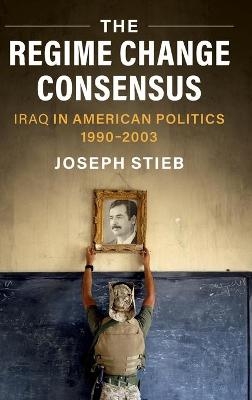
The Regime Change Consensus
Iraq in American Politics, 1990-2003
Seiten
2021
Cambridge University Press (Verlag)
978-1-108-83824-5 (ISBN)
Cambridge University Press (Verlag)
978-1-108-83824-5 (ISBN)
The Regime Change Consensus offers a compelling look at how the United States pivoted from a policy of containment to regime change in Iraq after September 11, 2001, and traces how a coalition of political actors successfully argued that the totalitarian rule of Saddam Hussein's regime meant containment was a doomed policy.
Why did the United States invade Iraq, setting off a chain of events that profoundly changed the Middle East and the US global position? The Regime Change Consensus offers a compelling look at how the United States pivoted from a policy of containment to regime change in Iraq after September 11, 2001. Starting with the Persian Gulf War, the book traces how a coalition of political actors argued with increasing success that the totalitarian nature of Saddam Hussein's regime and the untrustworthy behavior of the international coalition behind sanctions meant that containment was a doomed policy. By the end of the 1990s, a consensus belief emerged that only regime change and democratization could fully address the Iraqi threat. Through careful examination, Joseph Stieb expands our understanding of the origins of the Iraq War while also explaining why so many politicians and policymakers rejected containment after 9/11 and embraced regime change.
Why did the United States invade Iraq, setting off a chain of events that profoundly changed the Middle East and the US global position? The Regime Change Consensus offers a compelling look at how the United States pivoted from a policy of containment to regime change in Iraq after September 11, 2001. Starting with the Persian Gulf War, the book traces how a coalition of political actors argued with increasing success that the totalitarian nature of Saddam Hussein's regime and the untrustworthy behavior of the international coalition behind sanctions meant that containment was a doomed policy. By the end of the 1990s, a consensus belief emerged that only regime change and democratization could fully address the Iraqi threat. Through careful examination, Joseph Stieb expands our understanding of the origins of the Iraq War while also explaining why so many politicians and policymakers rejected containment after 9/11 and embraced regime change.
Joseph Stieb is Assistant Professor of National Security Affairs at the U.S. Naval War College. His articles and essays can be found in Diplomatic History, Modern American History, The International History Review, War on the Rocks, The Washington Post, Foreign Policy, and American Purpose.
Introduction: 1. A Hope, Not a Policy: Containment and Regime Change During the Gulf Crisis, 1990–1991; 2. The Fallout From Victory: Containment and its Critics, 1991–1992; 3. The Long Watch: The High Years of Containment 1994–1996; 4. Saddam Must Go: Entrenching the Regime Change Consensus, 1997–2000; 5. Not Whether, But How and When: The Iraq Debate from 9/11 to the Invasion; Conclusion: Containment, Liberalism and the Regime; Bibliography; Index.
| Erscheinungsdatum | 28.06.2021 |
|---|---|
| Reihe/Serie | Military, War, and Society in Modern American History |
| Zusatzinfo | Worked examples or Exercises |
| Verlagsort | Cambridge |
| Sprache | englisch |
| Maße | 160 x 235 mm |
| Gewicht | 560 g |
| Themenwelt | Geisteswissenschaften ► Geschichte ► Regional- / Ländergeschichte |
| Geschichte ► Teilgebiete der Geschichte ► Militärgeschichte | |
| ISBN-10 | 1-108-83824-3 / 1108838243 |
| ISBN-13 | 978-1-108-83824-5 / 9781108838245 |
| Zustand | Neuware |
| Informationen gemäß Produktsicherheitsverordnung (GPSR) | |
| Haben Sie eine Frage zum Produkt? |
Mehr entdecken
aus dem Bereich
aus dem Bereich
neueste Manipulationstechniken als Waffengattung der NATO
Buch | Softcover (2023)
Westend (Verlag)
CHF 33,55
Deutschlands großer Volksaufstand
Buch | Softcover (2024)
Propyläen Verlag
CHF 30,80


